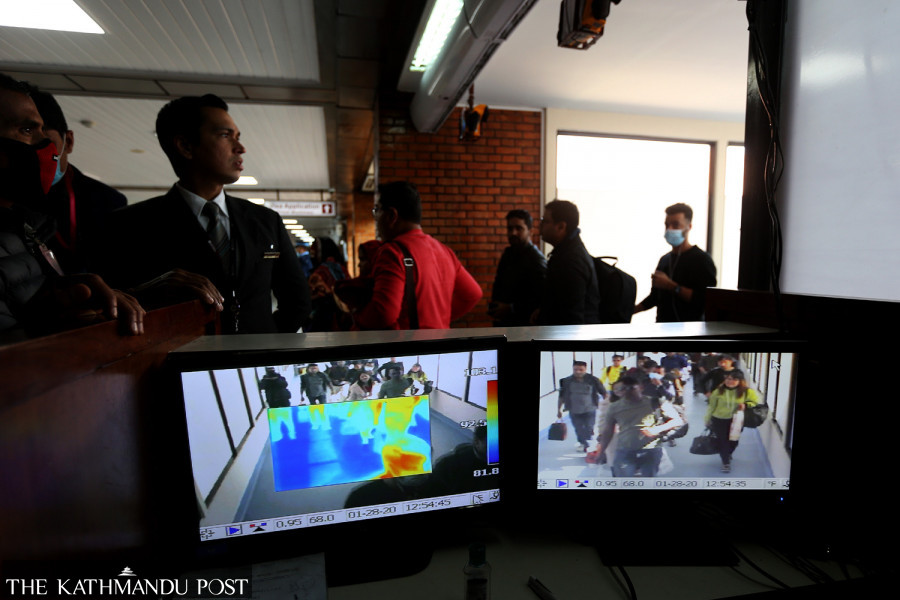Health
International Health Regulations’ annual review starts in Kathmandu
Due to the apathy of successive governments in strengthening the health desks and taking other measures, the health desks in Nepal are only in name, according to experts.
Arjun Poudel
In mid-June, a Nepali national, who had just landed at the Kathmandu airport by a Dubai flight, was found suffering from fever and had rashes all over his body. Medics deployed at the health desk at the airport suspected that the man might have been infected with the monkeypox virus.
The man was immediately isolated and sent to the Sukraraj Tropical and Infectious Disease Hospital, where he underwent further testing.
“Isolation of the suspect and referring to the hospital was part of the measures needed for an early detection and control of a disease of international concern,” said Gopal Pandey, a health worker serving at the health desk set up at the Tribhuvan International Airport. “Though it was later found that the man was infected not with monkeypox, but leprosy, this is the standard procedure for dealing with suspicious cases.”
The International Health Regulations-2005 is a legally binding agreement among 196 countries to build the capability to detect and report potential public health emergencies, worldwide.
Nepal set up an international health desk at Tribhuvan International Airport and at a few land crossings with India, following the outbreak of the Ebola Virus in West Africa. Setting up health desks, stepping up surveillance measures to assess the risks and reporting to the UN health body is an international obligation as per the International Health Regulations-2005.
Due to the apathy of successive governments in strengthening the health desks and taking other measures, the health desks in Nepal are only in name, according to experts.
“After the start of the Covid-19 pandemic, the government set up more health desks at various checkpoints and deployed more health workers, but these desks have not been able to work efficiently,” said an official at the Epidemiology and Disease Control Division.
To strengthen the health desks, step up the surveillance and to strengthen the recording and reporting systems, the Ministry of Health and Population has organised a joint annual review of the International Health Regulations, in Kathmandu. Experts from the World Health Organisation’s headquarters, WHO South-East Asia Region, and experts from related fields have been invited to a review meeting that started on Monday.
“We have hoped that this meeting will help us strengthen our existing system,” said Dr Chuman Lal Das, director at the Epidemiology and Disease Control Division. “We will tell the experts about what we are doing currently, what we are trying to do and the problems we encountered, and listen to an expert team from a related field on what we need to do to improve our situation.”
The Health Ministry said that there are 17 health desks in operation, 13 in land crossings with India, two at border points with China and two each at the airports in Kathmandu and Bhairahawa.
Health workers manning the desks examine if the people entering the country have been inoculated with the Covid-19 vaccine or have the latest polymerase chain reaction test reports.
Health workers are also tasked to perform antigen testing, and screen suspicious cases for monkeypox and other deadly diseases.
Doctors in Nepal say due to high mobility of people from across the globe, there is a high chance of any disease seen in any corner of the world spreading to many countries in a short span of time.
Nepal has reported almost all variants and sub-variants of Covid-19.
“Early detection of diseases is instrumental in preventing them from becoming widespread,” said Dr Sher Bahadur Pun, the chief of the Clinical Research Unit at the Sukraraj Tropical and Infectious Disease Hospital. “For an early detection, our disease surveillance mechanism must be robust and the other agencies concerned must work hard.”
The International Health Regulations (2005) provide an overarching legal framework that defines countries’ rights and obligations in handling public health events and emergencies that have the potential to cross borders.




 9.83°C Kathmandu
9.83°C Kathmandu















